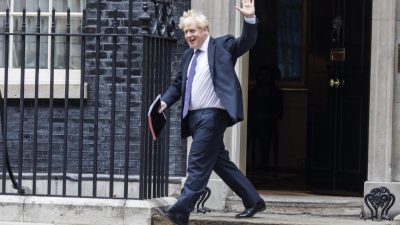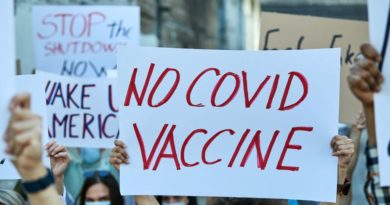Boris Johnson at Sea: Coronavirus Confusion in the UK

The tide has been turning against UK Prime Minister Boris Johnson. Oafishly, he has managed to convert that tide into a deluge of dissatisfaction assisted by the gravitational pull of singular incompetence. Much of this is due to such errors of communication as committed last month, when he got into a tangle over new coronavirus restrictions in England’s northeast.
In responding to a question on these new regulations, the prime minister erred in stating that the rule-of-six limit on gatherings did not apply to people meeting outdoors. “It is a six in a home or in hospitality but not six outside.” The government’s official guidance stated something rather different. “When meeting friends and family you do not live with (or have formed a support bubble with) you must not meet in a group of more than 6, indoors or outdoors.” This would be “against the law and the police will have the powers to enforce these legal limits, including to issue fines (fixed penalty notices) of £200, doubling for further breaches up to a maximum of £6,400.” Stiff consequences tend to follow from such misunderstandings.
Having fallen into his own trap, the prime minister had to concede his error. “Apologies,” he tweeted, “I misspoke today.” Having corrected himself on the regulations limiting such socialising both indoors and out, he tried to wave the much tattered flag of patriotic encouragement. “This is vital to control the spread of coronavirus and keep everyone safe. If you are in a high risk area, please continue to follow the guidelines from local authorities.” But evidently be wary of what the prime minister tells you.
It was all part of a push combining sterner measures in attempting to control coronavirus transmission while keeping some semblance of economic normality. “What we don’t want is to have to take even more severe measures as we go through Christmas,” warned Foreign Secretary Dominic Raab on LBC radio. “And that’s why we need to take the proportional, targeted measures we are taking now.” As a result, the laws and regulations have pleased no one and confused everyone.
Any balanced assessment would have to conclude that there is no uniform UK strategy on coping with coronavirus. Within the sceptred isle are such figures as Scottish First Minister Nicola Sturgeon, who feel that Johnson has been all too timorous in dealing with the virus. Her own scientific advisers had warned her that Johnson’s approach was inadequate in reducing the rate of transmission. “I’ve made a judgment that we are again at a tipping point with COVID and I’m looking at data that alarms me, frankly.” (The number of infections is currently hovering between a 15,000 to 20,000 cases a day.)
Members of Johnson’s own scientific advisory team tend to agree, feeling that the public health hammer needs to be brought to bear. Professor John Edmunds of the London School of Hygiene and Tropical Medicine was distinctly disapproving of government policy on BBC radio. “Overall, I don’t think the measures have gone anywhere near far enough. In fact, I don’t even think the measures in Scotland have gone far enough.”
None of this was encouraging, even to a conservative magazine Johnson once edited. Fraser Nelson, who now holds the reins at The Spectator, conceded that “Johnson’s overall COVID policy is now a mystery.” Did he intend to “flatten the curve”? Was he attempting “to eliminate COVID altogether? We might think his strategy is inspired; we might think it insane – but need to know what it is.” In Fraser’s view, the very man is an absentee, as is his government, “adrift, defined by its avoidable mistakes: COVID policy, Brexit party discipline… In all these things there is a conspicuous – and baffling – lack of leadership.”
With his popularity suffering, Johnson’s reaction is one of blithe disregard, if not wilful blindness. His October 6 speech concluding the Conservative Party Conference promoted a charge of Light Brigade optimism. He decried the “nonsense” that his own battle with COVID had “somehow robbed me of my mojo.” It was “self-evident drivel,” even “seditious propaganda” from saboteurs wanting the government to fail. He did concede to getting a fright, and being too fat; but he had found an inner, thinner hero.
He promised, instead of going back to the good old pre-COVID days in 2019, “to do better: to reform our system of government, to renew our infrastructure; to spread opportunity more widely and fairly and to create the conditions for a dynamic recovery that is led not by the state but by free enterprise.” He promised 48 hospitals. “Count them,” he dared critics sceptical of the government’s numeracy skills. “That’s the eight already underway, and then 40 more between now and 2030.”
With waffly ambitiousness, he promised more teachers, more funding for education, more police, better resources to improve rusted skills. There was even an aspirational moment of greening: that the UK would “become the world leader in low cost clean power generation – cheaper than coal, cheaper than gas”. Guilt free power generation, he called it.
Such a performance would have done little to inspire confidence even amongst the Tory faithful. Ahead of the speech, Andrea Thorpe, Conservative Association chair in Kent, spoke of the prime minister’s “lost focus,” and frustration at those “insanely complicated rules which are creating acrimony and exasperation”. Economic damage arising from the new coronavirus regulations, she feared, might exceed that of the virus.
The report cards of most nation states towards COVID-19 have been mixed, ranging from the modest to the terrifically horrible. Initial star performers have tumbled into second waves of infection. Lashings of dark eugenic theory have kept company with police truncheons and handcuffs backed by medical decree. The United Kingdom, if it has anything to boast about, can point to the world’s fifth highest death toll and the worst contraction in GDP of any G7 nation. But to all of this can also be added the steady, consistent confusions about regulations newly passed and newly misunderstood. A very Boris outcome.
*
Note to readers: please click the share buttons above or below. Forward this article to your email lists. Crosspost on your blog site, internet forums. etc.
Dr. Binoy Kampmark was a Commonwealth Scholar at Selwyn College, Cambridge. He lectures at RMIT University, Melbourne. He is a frequent contributor to Global Research and Asia-Pacific Research. Email: [email protected]
Featured image is from InfoBrics
*** This article has been archived for your research. The original version from Global Research can be found here ***


